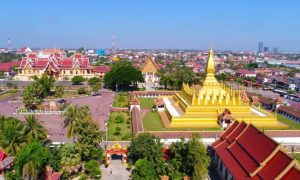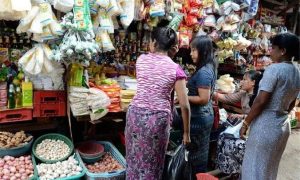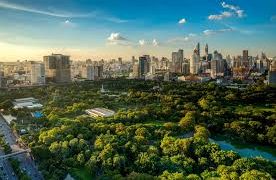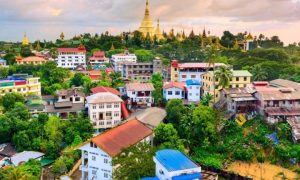With the globalimmigrantsTrends are changing and more and more foreigners are choosing to travel to the culturally fascinating country of Myanmar. Despite Myanmar's rich history, natural beauty and low cost of living, manyImmigration to MyanmarQuestions are often raised about its cost of living before deciding to settle down. So, as an immigrant, are you ready to meet the challenges of living in Myanmar? Let's take an in-depth look at the cost of living in this country and analyze the opportunities and challenges.
🏠 Housing: rent vs. ownership
In Myanmar, housing costs vary significantly by city and region.YangonAs Myanmar's largest city and commercial center, rents are relatively high. For example, a one-bedroom apartment in the center of the city rents for between 500,000 and 1,000,000 kyats (approximately US$250-500). In contrast, in some second-tier cities such asMandalay, province and second city of Myanmar (Burma)maybeNaypyidaw or Naypyidaw, capital of Myanmar (Burma)The rent will be much lower, and an apartment of the same size may cost as little as 250,000 to 500,000 kyats (about US$125-250) per month.
If you choose to buy your own property, although the Myanmar real estate market is relatively young, there are strict regulations for foreign investors to follow for real estate investment in Myanmar. Typically, foreigners can only purchase land or property through partnerships with local businesses or in special economic zones.
🍴 Diet: Eating out vs. home-cooking
Food in Myanmar is relatively inexpensive, especially when shopping in local markets. The traditional Burmese dining culture is very rich and a variety of rice, noodle and fish dishes are common. You can easily enjoy a large meal at a local restaurant for around 1,000 to 5,000 kyat (about US$0.5-2.5).
If you choose to cook your own meals and buy ingredients such as fresh vegetables, rice and chicken, you will usually spend no more than 150,000 to 250,000 kyats (about US$75-125) per month. Compared to other Southeast Asian countries, the cost of food in Myanmar remains low, making it an attractive option for migrants on a budget.
🚗 Transportation: public transportation and private cars
Myanmar's public transportation system is not as developed as some of its neighbors, but buses, cabs and motorcycle rentals are still available in major cities such as Yangon. Bus tickets usually range from 200-500 kyat (approximately US$0.1-0.25), while cabs start at 1,500-2,000 kyat (approximately US$0.75-1).
If you are planning to buy a private car, Myanmar's car market is relatively low and second-hand cars are cheaper, but car maintenance costs and fuel costs can be higher in some areas. While the price of fuel is approximately 1,000 kyats (about US$0.50) per liter, road conditions and traffic can affect the driving experience.
💡 Electricity and water: basic costs of living
Electricity and water are relatively inexpensive in Myanmar, but sometimes it may be necessary to use a generator or other back-up power equipment due to the erratic supply of electricity. Household electricity costs typically range from 10,000 to 20,000 kyats (approximately US$5-10) per month. For water, the average monthly cost ranges from about 5,000 to 10,000 kyats (US$2.5-5).
It is important to note that with Myanmar's rapid urbanization and infrastructure development, there may be intermittent supply problems with water and electricity facilities in certain locations, so some residents may choose to install backup water and electricity systems.
🏥 Health care: primary care and private hospitals
Medical facilities in Myanmar are relatively underdeveloped, but it is still possible to find a number of private hospitals and clinics in cities such as Yangon and Mandalay that offer a relatively high standard of medical care. Generally, the cost of a general consultation ranges from 10,000-30,000 kyats (US$5-15).

In cases where surgery or higher-end medical care is required, the costs can rise significantly. In such cases, some foreigners choose to travel to neighboring countries such as Thailand or Singapore for treatment, especially for major surgeries or serious illnesses.
For immigrants settling for a long period of time, it is advisable to purchase international health insurance to cover medical expenses.
💼 Work and Tax: Employment Opportunities and Individual Taxation
The job market in Myanmar, while expanding, remains challenging compared to other countries in Southeast Asia. Foreigners usually need to have a specialized work visa to work legally in Myanmar. And there is a high demand for skilled foreign personnel in a number of fields, particularly engineering, education and IT.
As for taxes, Myanmar has a low personal income tax, with rates usually ranging from 1%-30%, depending on income level. This makes Myanmar a less tax burdensome country for those foreign professionals with high incomes.
🌍 Cultural adaptation and socialization: integration into local life
Acculturation is a challenge for many migrants. Myanmar has a rich history and cultural traditions, especially Buddhism. Although the people are friendly and welcoming, it can take time and patience for expats to assimilate into the local community. Myanmar's society is relatively conservative, with customs emphasizing etiquette and respect for elders and religious beliefs.

Socially, many foreigners choose to make friends by attending social events or joining international communities. Foreigners' social circles are usually concentrated in large cities such as Yangon and Mandalay.
🔑 Summary:Life as an immigrant in Myanmarcost analysis
Overall, the cost of living in Myanmar is lower compared to other Southeast Asian countries, especially in terms of housing, food and daily expenses. Myanmar is certainly an affordable option for migrants on a limited budget. However, there are some challenges associated with migrating to Myanmar, especially in terms of infrastructure, healthcare services and cultural adaptation.
If you are planning to settle in Myanmar for the long term, make sure you are aware of these costs and challenges of living and prepare accordingly. With proper planning and adaptation, Myanmar will be a place of opportunity and cultural fascination that is worth exploring and experiencing.






